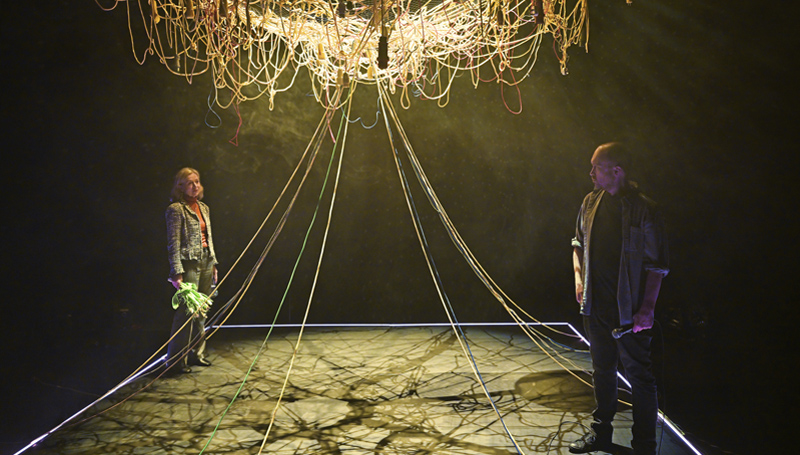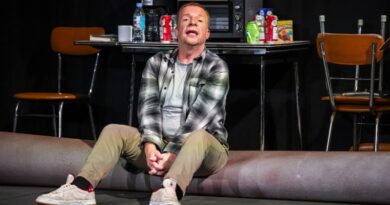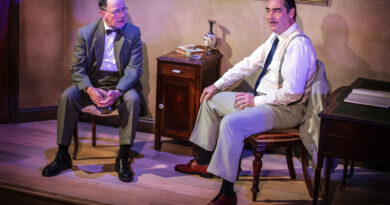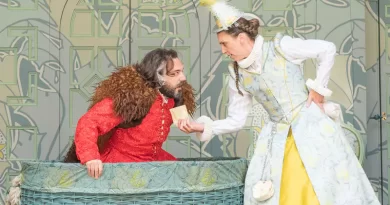“A Family Business” at Théâtre des Capucins, Luxembourg
Dana Rufolo in Luxembourg
We choose to remain blissfully unaware of the fact that life as we know it would change forever were there a nuclear incident, either accidental or intentional, caused by the detonation of nuclear weapons. The threat seems so overpowering and unassailable that it feels like the best recourse is to pretend the danger does not exist and to hide under the blanket of ignorance.

Andrea Quirbach and Efé Agwale.
Photo credit: Andreas J. Etter.
The semi-documentary theatre play A Family Business: A Show About How Not to Blow Up the Planet by Chris Thorpe and directed by Rachel Chavkin is gently prodding us to awaken from our sleep of paralysis; as the playwright said in a recent interview in the online The Arts Dispatch: “This is a show about nuclear treaties and the people who work on them. But it’s also about how we can all regain a sense of agency – of connection with an issue that can feel far away, the province of ‘experts’, but is in fact full of ordinary people like us, always present in the way it shapes our daily experience”.
A Family Business, co-produced by China Plate in the UK and Staatstheater Mainz in Germany, toured to Luxembourg’s Théâtre des Capucins on 24 and 25 January, 2024. It embarks on a UK tour from 1 February through 2 March.
A Family Business is an eye-opener performance, with enough scary facts about the increasing risk of nuclear conflagration given wars, ageing weapons and threats of hacks into the computer systems controlling the silos, to make anyone’s hair turn white. Thorpe’s play heroizes the women and men who have been instrumental in spreading awareness of the nuclear threat to humanity at the upper echelons of government – the diplomats and political leaders.
The play concentrates on the positive symbol for change represented by the United Nations’ Treaty on the Prohibition of Nuclear Weapons which went into effect on January 22, 2021. As of January 2024, 70 countries have ratified or acceded to the treaty, but Thorpe reminds us that the treaty is not an intellectual exercise, and ordinary citizens should feel like they have a right to be involved in the process of nuclear disarmament.

Greg Barnett and Chris Thorpe.
Photo credit: Andreas J. Etter.
The Théâtre des Capucins as a member of the Théâtres de la Ville de Luxembourg certainly did its part to provide access to the discourse, with a pre-performance talk given by a theatre expert on the issues and history of A Family Business each evening, and on one evening the model for the character Veronique in the play -Véronique Christory (Senior Arms Adviser for the International Committee of the Red Cross at the United Nations) – was present to answer questions from the audience. On the second evening, Greenpeace Luxembourg leaders were present to field questions.
However, A Family Business is not scripted as a direct call to activism. It is a play with a stage set consisting of a jumble of electric wires and light plugs hanging like a mushroom-shaped cloud above the stage, with a circle of single wires that resembling the legs of an octopus stretching down to the stage floor itself. The cast is composed of professional actors – namely Thorpe as narrator; bilingual Andrea Quirbach as Veronique of the UN who works flat-out to get the treaty ratified; Efé Agwale who plays Layla, a UN official representing the anti-nuclear weapons attitude of the global south, in particular the African nations; and lastly Greg Barnett as the office cynic James who recognizes how difficult it is to convince diplomats and international organizations to adopt the treaty.
The character in A Family Business who has the strongest theatrical persona is Thorpe himself. He acts as a bridge between the stage and the audience, constantly upholding the trope of being a totally ordinary bloke, a Kumpel who frequently inserts the word ‘fuck’ into the conversation and who has no special talents.
Thorpe sustains this persona evidently because his theme in A Family Business is that if ordinary citizens gather together as a group to demand an end to stockpiled nuclear weapons, they will achieve miracles. However, Thorpe has put a lot of energy into the character; prior to the show, he walked around the city of Luxembourg going from the Eurocentric plateau of Kirchberg to the Grund valley where some of the oldest Luxembourgers live in relative poverty, so as to get a feel for the economic inequality in the city.
In a place where more than half the population is not native and has good salaries and a high level of education, and where intralingual communication is essential, the ‘average bloke’ persona falls a bit flat; it is probably better adapted to the class system prevalent in the UK.
Nonetheless, the message is clear: just as with climate change and genocidal wars, we must join together to stop this danger to humanity and to the earth itself. We can wish for a miracle that would have the world’s some 20,000 nuclear weapons simply reverse gravitational pull and float up without exploding to travel through the atmosphere and into deep space where they could gambol for eons of time, but that miracle isn’t going to happen without the birth of a new mindset that prioritizes human cooperation and ingenuity.
UK tour details are here.









